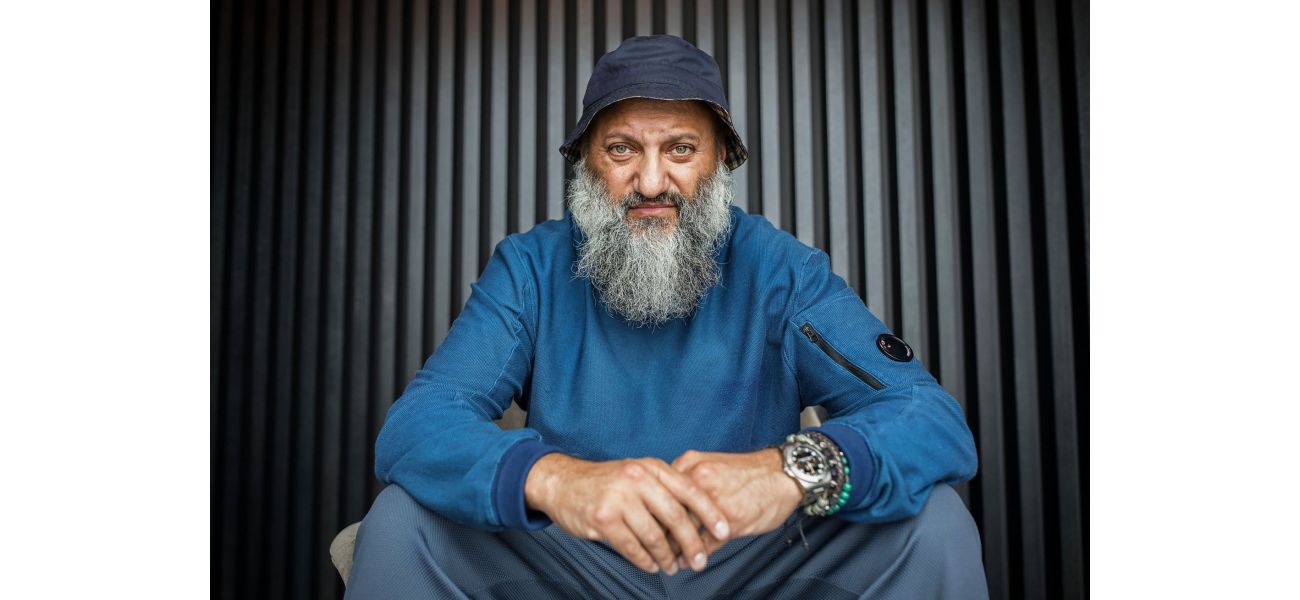I used to fight twice a week.
Riaz was involved with a violent group, The Baby Squad, during the 90s.
November 14th 2024.

Riaz Khan grew up in the eighties as a minority in Leicester, UK. During this time, the National Front, a political party with a nationalist and anti-immigration stance, was causing trouble and promoting hate. As a quiet and unassuming teenager, Riaz felt out of place and struggled to find a sense of belonging.
One day, when Riaz was 17, he saw a group of young men confidently walking by. They were part of a notorious hooligan firm called 'The Baby Squad' and were affiliated with Leicester City FC. Riaz was immediately drawn to their appearance and demeanor, and desperately wanted to be a part of their group.
He started mimicking their style, dressing in designer brands like Fila and Puma, and even getting a perm. His plan worked, and he was soon recruited into the Squad. This was a defining moment for Riaz, as he finally felt like he belonged somewhere. Being a part of the Baby Squad gave him a sense of pride and acceptance, especially during a time when he felt like an outsider in his own country.
Riaz's first away trip with the Baby Squad was to Birmingham, and he vividly remembers the experience. As they walked through the train station, people couldn't help but stare at them. The group of 70 young lads proudly wearing their designer gear was a sight to see. However, things quickly turned violent, and Riaz was arrested before he could even throw a punch. This only solidified his involvement with the group, and he bonded with other members while spending time in a cell.
Although he was eventually released without charge, Riaz had gotten a taste of violence, and he liked it. He continued to follow the team and get into fights on match days, seeing it as a way to not only have fun but also to rebel against the status quo. The Baby Squad, with its diverse group of members, was also a way for Riaz to stand up against the hatred promoted by the National Front.
Football hooliganism has a long history, dating back to the 1970s when organized groups would engage in aggressive confrontations with rival supporters. However, the violence reached a peak in 1985 when 39 people died during the European Cup Final between Liverpool and Juventus. This event led to increased policing, crackdowns, and stricter measures to prevent hooliganism.
While the number of football-related arrests has decreased significantly since the 80s, hooliganism is still present. In fact, in the 2022 to 2023 football season, there were 2,264 football-related arrests, according to the latest figures available. This is why writer Sam Diss decided to explore the history and context of football violence in his podcast, The English Disease.
Sam believes that it's important to look beyond the nostalgia and address the complexities and cultural significance of hooliganism. It's not just a subculture that comes and goes; it has a deep impact on the lives of those who were involved in it, like Riaz. Today, Riaz is a respected family man and teacher, but he will always remember his time as a member of the Baby Squad, and how it gave him a sense of belonging and pride during a challenging time in his life.
As a teenager, Riaz was fascinated when he first saw the notorious hooligan firm "The Baby Squad" confidently stroll past him. Raised in Leicester by his Pakistani father and Afghan mother, he was a quiet and unassuming young man who stayed out of trouble. However, growing up as a minority in the 1980s was tough, with the rise of the National Front and anti-immigration sentiments. Riaz felt out of place and isolated, until he was 17 and saw the Baby Squad for the first time.
The Baby Squad was a hooligan firm affiliated with Leicester City FC, consisting of teenage members who were known for their confident demeanor and stylish outfits. They were inadvertently named by a police officer who was struck by their youthful appearances. Riaz, desperate to be a part of their gang, began mimicking their look, dressing in designer brands like Fila and Puma, and sporting a perm. His plan worked, and he was quickly recruited into the Squad.
Riaz recalls his first away trip with the Baby Squad, where he and 70 other young lads took a train to Birmingham. He remembers the attention they received from others, and how it was a defining moment for him. In the casuals culture of football hooliganism, where fans rejected the traditional team colors and instead wore designer brands, Riaz finally felt like he belonged. No longer was he just the Asian kid, he was part of a group of people who accepted him for who he was.
Despite being arrested on that first trip and put in a cell for a cooling off period, Riaz's involvement with the Baby Squad only grew stronger. He was drawn to their confidence and swagger, and soon began following the team to every match, spending his Saturdays and Wednesdays getting into fights.
But for Riaz, being a part of the Baby Squad was more than just about violence. It was about toppling the status quo and standing up against the hatred of the National Front. The multicultural Baby Squad, led by a Black member, was a symbol of unity and resistance. Football hooliganism had a deeper meaning for Riaz and his fellow hooligans, and it was a way to fight back against the racism and bigotry they faced in their everyday lives.
The history and context of football hooliganism is a complex and often misunderstood topic. In the 1980s, the violence reached a peak at the 1985 European Cup Final in Brussels, where 39 people tragically lost their lives. This event led to increased policing and crackdowns on hooliganism, but it still remains a prevalent issue in the football world today.
Sam Diss, a West Ham fan and writer, has delved into the world of football hooliganism in his podcast, The English Disease. He wanted to go beyond the nostalgia and address the underlying issues and cultural importance of football-related violence. For Diss, it was not just a subculture, but a phenomenon that needed to be understood and explored.
Riaz, now 58 and a respected family man and teacher, looks back on his time with the Baby Squad with a mix of nostalgia and regret. While he acknowledges the violence and chaos that came with being a hooligan, he also recognizes the sense of belonging and pride he felt in being a part of something bigger than himself. Football hooliganism may have its dark side, but for Riaz and many others, it was also a way to find a sense of identity and purpose in a world where they often felt like outsiders.
One day, when Riaz was 17, he saw a group of young men confidently walking by. They were part of a notorious hooligan firm called 'The Baby Squad' and were affiliated with Leicester City FC. Riaz was immediately drawn to their appearance and demeanor, and desperately wanted to be a part of their group.
He started mimicking their style, dressing in designer brands like Fila and Puma, and even getting a perm. His plan worked, and he was soon recruited into the Squad. This was a defining moment for Riaz, as he finally felt like he belonged somewhere. Being a part of the Baby Squad gave him a sense of pride and acceptance, especially during a time when he felt like an outsider in his own country.
Riaz's first away trip with the Baby Squad was to Birmingham, and he vividly remembers the experience. As they walked through the train station, people couldn't help but stare at them. The group of 70 young lads proudly wearing their designer gear was a sight to see. However, things quickly turned violent, and Riaz was arrested before he could even throw a punch. This only solidified his involvement with the group, and he bonded with other members while spending time in a cell.
Although he was eventually released without charge, Riaz had gotten a taste of violence, and he liked it. He continued to follow the team and get into fights on match days, seeing it as a way to not only have fun but also to rebel against the status quo. The Baby Squad, with its diverse group of members, was also a way for Riaz to stand up against the hatred promoted by the National Front.
Football hooliganism has a long history, dating back to the 1970s when organized groups would engage in aggressive confrontations with rival supporters. However, the violence reached a peak in 1985 when 39 people died during the European Cup Final between Liverpool and Juventus. This event led to increased policing, crackdowns, and stricter measures to prevent hooliganism.
While the number of football-related arrests has decreased significantly since the 80s, hooliganism is still present. In fact, in the 2022 to 2023 football season, there were 2,264 football-related arrests, according to the latest figures available. This is why writer Sam Diss decided to explore the history and context of football violence in his podcast, The English Disease.
Sam believes that it's important to look beyond the nostalgia and address the complexities and cultural significance of hooliganism. It's not just a subculture that comes and goes; it has a deep impact on the lives of those who were involved in it, like Riaz. Today, Riaz is a respected family man and teacher, but he will always remember his time as a member of the Baby Squad, and how it gave him a sense of belonging and pride during a challenging time in his life.
As a teenager, Riaz was fascinated when he first saw the notorious hooligan firm "The Baby Squad" confidently stroll past him. Raised in Leicester by his Pakistani father and Afghan mother, he was a quiet and unassuming young man who stayed out of trouble. However, growing up as a minority in the 1980s was tough, with the rise of the National Front and anti-immigration sentiments. Riaz felt out of place and isolated, until he was 17 and saw the Baby Squad for the first time.
The Baby Squad was a hooligan firm affiliated with Leicester City FC, consisting of teenage members who were known for their confident demeanor and stylish outfits. They were inadvertently named by a police officer who was struck by their youthful appearances. Riaz, desperate to be a part of their gang, began mimicking their look, dressing in designer brands like Fila and Puma, and sporting a perm. His plan worked, and he was quickly recruited into the Squad.
Riaz recalls his first away trip with the Baby Squad, where he and 70 other young lads took a train to Birmingham. He remembers the attention they received from others, and how it was a defining moment for him. In the casuals culture of football hooliganism, where fans rejected the traditional team colors and instead wore designer brands, Riaz finally felt like he belonged. No longer was he just the Asian kid, he was part of a group of people who accepted him for who he was.
Despite being arrested on that first trip and put in a cell for a cooling off period, Riaz's involvement with the Baby Squad only grew stronger. He was drawn to their confidence and swagger, and soon began following the team to every match, spending his Saturdays and Wednesdays getting into fights.
But for Riaz, being a part of the Baby Squad was more than just about violence. It was about toppling the status quo and standing up against the hatred of the National Front. The multicultural Baby Squad, led by a Black member, was a symbol of unity and resistance. Football hooliganism had a deeper meaning for Riaz and his fellow hooligans, and it was a way to fight back against the racism and bigotry they faced in their everyday lives.
The history and context of football hooliganism is a complex and often misunderstood topic. In the 1980s, the violence reached a peak at the 1985 European Cup Final in Brussels, where 39 people tragically lost their lives. This event led to increased policing and crackdowns on hooliganism, but it still remains a prevalent issue in the football world today.
Sam Diss, a West Ham fan and writer, has delved into the world of football hooliganism in his podcast, The English Disease. He wanted to go beyond the nostalgia and address the underlying issues and cultural importance of football-related violence. For Diss, it was not just a subculture, but a phenomenon that needed to be understood and explored.
Riaz, now 58 and a respected family man and teacher, looks back on his time with the Baby Squad with a mix of nostalgia and regret. While he acknowledges the violence and chaos that came with being a hooligan, he also recognizes the sense of belonging and pride he felt in being a part of something bigger than himself. Football hooliganism may have its dark side, but for Riaz and many others, it was also a way to find a sense of identity and purpose in a world where they often felt like outsiders.
[This article has been trending online recently and has been generated with AI. Your feed is customized.]
[Generative AI is experimental.]
0
0
Submit Comment





